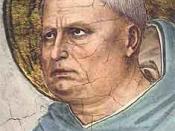Explain Aquinas' view of Natural Moral Law
Natural Law, the idea that everything within the world has a purpose, uses the definition that a good object, is one that fulfils its purpose, so for instance; a good pen would be a pen that; doesn't leak, doesn't break, writes well, doesn't dry and is comfortable. This absolute morality which looked like it could hold water as it could apply to any culture or religion, but there is a problem, as it is fine to apply this law to objects, but what about humans? What makes a good human? A good human would be a human that fulfilled the purpose of a human. But what is the purpose of a human?
Aristotle believed the answer to this question lies within the idea that humans are "thinking, feeling animals". The purpose of an animal is to survive, eat and reproduce, these all apply to humans, but we also have higher, intellectual purposes such as feeling and thinking.
Then in the 13th Century, St Thomas Aquinas came and developed this idea, and then went on to form his own version of moral law. Aquinas developed the idea of a human's purpose, so he came up with his own.
His idea was around 5 primary precepts or laws for all to adhere to:
1.To learn
2.To live
3.To reproduce
4.To contribute to society
5.To worship God
While Aquinas thought of these rules, he believed they were ultimately created by God as guidelines for living. The first four of these rules, were taken from various ancient Greek philosophers, but mainly Aristotle, who also believed in the idea of Natural Law. Then Aquinas, a devout Christian and strong believer in God, added the fifth primary precept to worship God.
Then Aquinas established...


